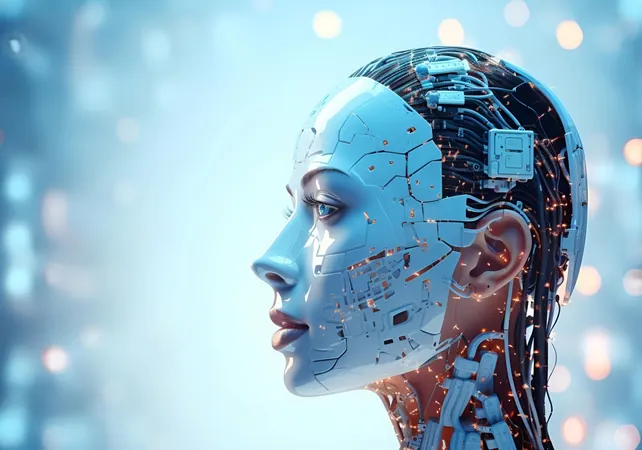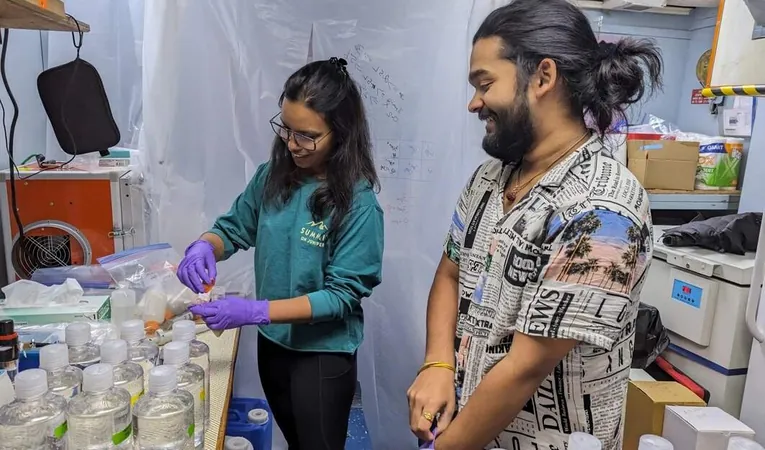
Revolutionary AI Mimics Human Brain to Watch and Interpret Videos Like Never Before!
2024-12-15
Author: Jia
Introduction
In a groundbreaking development, researchers at Scripps Research have introduced MovieNet, an advanced artificial intelligence (AI) model that mirrors the way the human brain comprehends moving images, making it a game-changer for various applications.
Understanding Dynamic Scenes
While traditional AI systems are proficient at analyzing still images, MovieNet excels in understanding dynamic, continuous scenes. This innovative approach, outlined in a study published in the Proceedings of the National Academy of Sciences, holds promise for transformative applications in fields such as medical diagnostics, autonomous vehicles, and beyond.
Significance of MovieNet
Hollis Cline, the director of the Dorris Neuroscience Center at Scripps Research and the study’s senior author, explained the significance of this advancement: “The brain doesn’t just see still frames; it creates an ongoing visual narrative.” He continued, “By examining how neurons process these sequences, we were inspired to replicate those principles in AI.”
Research Focus and Methodology
This research focused on tadpoles, whose visual processing systems are incredibly adept at detecting and responding to moving stimuli. By studying how tadpole neurons process variable features such as brightness changes and object rotation, Cline and his colleague Masaki Hiramoto aimed to develop an AI that learns to interpret continuous streams of visual information, similar to human perception.
Training and Performance
The team trained MovieNet to imitate this neural processing by feeding it video clips of tadpoles swimming. Impressively, MovieNet achieved an accuracy rate of 82.3% in identifying normal versus abnormal swimming behaviors, significantly outperforming human observers by 18% and surpassing other leading AI models like Google’s GoogLeNet, which managed only 72% accuracy.
Energy Efficiency
A standout feature of MovieNet is its remarkable energy efficiency. Traditional AI models often require extensive computational power, impacting the environment. In contrast, MovieNet reduces energy demands by distilling data into essential sequences while maintaining high performance. “By mimicking the brain,” Cline noted, “we’ve managed to create an AI that is both powerful and sustainable, crucial for industry scalability.”
Medical Implications
The medical implications of MovieNet are profound. Its ability to detect subtle changes over time could revolutionize early diagnosis of conditions such as neurodegenerative diseases and irregular heart rhythms. For instance, it might identify slight motor changes linked to Parkinson’s disease that human observers could easily miss, facilitating timely clinician intervention. Additionally, in drug discovery, MovieNet’s capacity to track cellular responses over time promises to enhance precision in screening, offering significant insights into drug interactions within biological systems.
Transformative Potential
MovieNet’s transformative potential doesn’t stop there. Its real-time visual analysis capabilities could set new standards across many sectors. In autonomous vehicles, it could enhance safety by promptly detecting changes in road conditions and pedestrian movements. In medical imaging, MovieNet could play a crucial role in identifying early-stage diseases by recognizing subtle anomalies previously overlooked.
Future Directions
Looking forward, Cline and Hiramoto plan to refine MovieNet, broadening its adaptability across various scenarios—from environmental monitoring to wildlife observation. Their research suggests that drawing inspiration from biological systems will remain vital in advancing AI technology.
Conclusion
By integrating brain-like processing capabilities, MovieNet not only enhances our understanding of AI but also introduces innovative pathways that could revolutionize different industries and improve the quality of life for many.
Stay tuned, as this AI technology may soon redefine how we interact with the world around us!




 Brasil (PT)
Brasil (PT)
 Canada (EN)
Canada (EN)
 Chile (ES)
Chile (ES)
 España (ES)
España (ES)
 France (FR)
France (FR)
 Hong Kong (EN)
Hong Kong (EN)
 Italia (IT)
Italia (IT)
 日本 (JA)
日本 (JA)
 Magyarország (HU)
Magyarország (HU)
 Norge (NO)
Norge (NO)
 Polska (PL)
Polska (PL)
 Schweiz (DE)
Schweiz (DE)
 Singapore (EN)
Singapore (EN)
 Sverige (SV)
Sverige (SV)
 Suomi (FI)
Suomi (FI)
 Türkiye (TR)
Türkiye (TR)